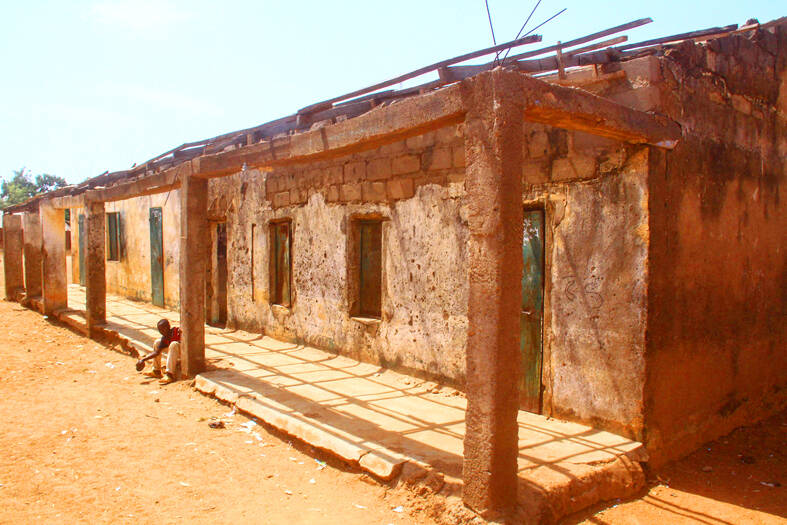More than 130 schoolchildren kidnapped by gunmen in northwestern Nigeria earlier this month were released unharmed yesterday, days before a deadline to pay a nearly US$681,000 ransom, officials and the army said.
The mass abduction in Kuriga, Kaduna State, on March 7 was one of the biggest attacks on a school in years and sparked a national outcry over insecurity.
The army said the hostages were freed in the early hours during a rescue operation.

Photo: AFP
Military spokesman Major General Edward Buba shared photographs of children wearing dust-coated uniforms in buses.
“The rescued hostages totaling 137 comprise of 76 females and 61 males. They were rescued in Zamfara State and would be conveyed and handed over to the Kaduna State Government for further action,” he said.
Teachers and residents previously said that about 280 pupils between the ages of eight and 15 were kidnapped when armed criminals known in Nigeria as bandits stormed the school on motorbikes.
Discrepancies between the number of people kidnapped and released are common in Nigeria due to unclear early reports and the return of those who go missing while fleeing attacks.
However, it was not clear why there was such a large difference between the figures this time.
Buba said that “all the captives had been rescued.”
He added that no troops had been wounded, but did not comment further, citing what he called the “ongoing operation.”
Nigerian President Bola Ahmed Tinubu welcomed the news and the “tireless dedication” of those who helped secure the children’s release.
Gangs routinely attack communities, loot villages and carry out mass kidnappings for ransom in northwest and northcentral Nigeria.
The gangs have targeted schools and colleges in the past, but there had been a lull in these attacks before the Kuriga abductions.
Last week, the gunmen demanded 1 billion naira (US$680,735) for the release of the missing children and staff. The government had said it would not pay the ransom.
Kidnap victims in Nigeria are often freed following negotiations with the authorities, although a 2022 law banned handing over money to kidnappers and officials deny ransom payments are made.
“The abducted Kuriga school children are released unharmed,” Kaduna State Governor Uba Sani said in a statement that did not specify how they were freed.
“This is indeed a day of joy,” he said, thanking “all Nigerians who prayed fervently for the safe return of the school children.”
Additional reporting by Reuters

Nvidia Corp yesterday unveiled its new high-speed interconnect technology, NVLink Fusion, with Taiwanese application-specific IC (ASIC) designers Alchip Technologies Ltd (世芯) and MediaTek Inc (聯發科) among the first to adopt the technology to help build semi-custom artificial intelligence (AI) infrastructure for hyperscalers. Nvidia has opened its technology to outside users, as hyperscalers and cloud service providers are building their own cost-effective AI chips, or accelerators, used in AI servers by leveraging ASIC firms’ designing capabilities to reduce their dependence on Nvidia. Previously, NVLink technology was only available for Nvidia’s own AI platform. “NVLink Fusion opens Nvidia’s AI platform and rich ecosystem for

‘WORLD’S LOSS’: Taiwan’s exclusion robs the world of the benefits it could get from one of the foremost practitioners of disease prevention and public health, Minister Chiu said Taiwan should be allowed to join the World Health Assembly (WHA) as an irreplaceable contributor to global health and disease prevention efforts, Minister of Foreign Affairs Lin Chia-lung (林佳龍) said yesterday. He made the comment at a news conference in Taipei, hours before a Taiwanese delegation was to depart for Geneva, Switzerland, seeking to meet with foreign representatives for a bilateral meeting on the sidelines of the WHA, the WHO’s annual decisionmaking meeting, which would be held from Monday next week to May 27. As of yesterday, Taiwan had yet to receive an invitation. Taiwan has much to offer to the international community’s

CAUSE AND EFFECT: China’s policies prompted the US to increase its presence in the Indo-Pacific, and Beijing should consider if this outcome is in its best interests, Lai said China has been escalating its military and political pressure on Taiwan for many years, but should reflect on this strategy and think about what is really in its best interest, President William Lai (賴清德) said. Lai made the remark in a YouTube interview with Mindi World News that was broadcast on Saturday, ahead of the first anniversary of his presidential inauguration tomorrow. The US has clearly stated that China is its biggest challenge and threat, with US President Donald Trump and US Secretary of Defense Pete Hegseth repeatedly saying that the US should increase its forces in the Indo-Pacific region

ALL TOGETHER: Only by including Taiwan can the WHA fully exemplify its commitment to ‘One World for Health,’ the representative offices of eight nations in Taiwan said The representative offices in Taiwan of eight nations yesterday issued a joint statement reiterating their support for Taiwan’s meaningful engagement with the WHO and for Taipei’s participation as an observer at the World Health Assembly (WHA). The joint statement came as Taiwan has not received an invitation to this year’s WHA, which started yesterday and runs until Tuesday next week. This year’s meeting of the decisionmaking body of the WHO in Geneva, Switzerland, would be the ninth consecutive year Taiwan has been excluded. The eight offices, which reaffirmed their support for Taiwan, are the British Office Taipei, the Australian Office Taipei, the